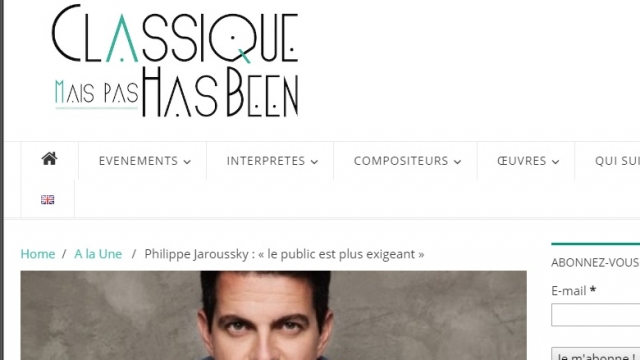2016-08-30, Classique mais pas has been, by youkaalii
Source/Read original: [x]
* This is a fan translation; no infringement of copyright is intended, no profit is being made. Translation by GM*
Philippe Jaroussky: The public is more demanding
INTERVIEW – The countertenor opens the festival Musique en Côte-basque with arias from baroque Italian operas that made him a star. Always open to audacious projects, Philippe Jaroussky has told us about his next challenge.
This summer you had to cancel some concerts. What is it like to lose your voice?
PJ: I had a bronchitis, this happens to me every ten years. I have already experienced this at the beginning of my career when I had less experience and more stress. This time I stayed calmer, even calmer than my fans on Facebook who seemed to be very worried (laughs). I prefer the public to be disappointed because they could not hear me than because they did hear me. And I don’t want to be a slave of my voice, to keep a normal life… or nearly normal.
Does the countertenor voice still provoke strong reactions?
The countertenor voice shows a different aspect of the male sensitivity. It is a voice that always provokes strong reactions – fascination or rejection – because it is not “natural”. My success was a big surprise. Although even after my final exams I planned to have a career in music I did not expect to be so exposed. I notice that the reactions changed over time. Proof of this is the new generation of countertenors who are emerging at the moment. These young singers can dream more about a career. The time is very open; never before has so much baroque opera been sung. The experience of the public is richer; the public is still fascinated but also demands dramatic qualities.
Which programme are you going to perform at Musique en Côte-Basque?
I’m returning to my first love, to arias of the first operas, from Monteverdi to Steffani passing Cavalli. The pieces are from 1640 to 1680, forty years of an immense musical richness going from the comical to the warrior to laments. I am surrounded by twelve musicians, and we link together arias and instrumental pieces.
On 29th July at the BBC Proms in London you sang… David Bowie.
A beautiful experience! I sang “Always crashing in the same car” (scroll down for video) in a ethereal version, a little like film music, very far from the original. I accepted because I am fascinated by Bowie. He was androgynous but his voice wasn’t. He needed his unbelievable costumes but at the bottom he was not so exuberant. I find this appealing; singing countertenor is a form of eccentricity.
You like taking unexpected paths, like singing the mélodie françaises. Is this sensible?
It is very tiring to be sensible (laughs). And I am daredevil enough… I will soon sing Les Nuits d’Eté from Berlioz, the entire cycle! [a cycle of mélodies for tenor or mezzosoprano, the editor]. I will attract critics, I know, but there is an irrepressible desire. They have great phrases, parts that are on the lower-middle register of the voice; this demands a patina. I have to work on things that I don’t do often and paradoxically this gives me more ease in the baroque repertory. Each style demands a lot of preparation. When I have to sing a big opera by Mozart, I don’t start preparing two weeks before the event! For Bérlioz I have given myself a year before singing Les Nuits d’Eté on stage.


